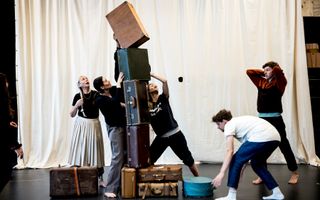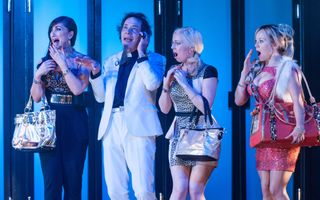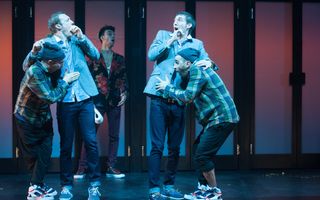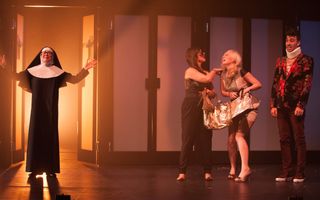 On Stage
On Stage
IDENTITY
The Comedy of Errors is a play inextricably linked with the notion of identity and mistaken identities. Of course, it is a story about two sets of identical twins existing in one place at one time. Yet the theme of identity is not only explored comically in the play. Antipholus of Syracuse perhaps faces the most pressing identity concern and feels tragically incomplete as an individual, feeling he has lost his ‘other half’ in the form of the twin brother he is searching for. He seeks to fill the void that he has always struggled with, hoping a reunion with his lost brother will provide a safe familial space in which he can fully know himself. The ultimate challenge he is faced with is trying to seek identity outside of his own self, looking for lost relatives who have become almost mythical in nature.
Characters in the play are often confident in knowing their own identity, but judgmental towards the identity of others, so that they ignore all the hints pointing to how they’re mistaken in their perceptions of those around them. The main crux of the identity concern is that this habit of being mistaken about other people forces some of the characters to question their notions of their own identity.
Shakespeare explores the notion of personal identity being viewed through the perceptions of others. It is only partially realised by what we think of ourselves. Here Antipholus of Syracuse, rather than trying to assert his own identity, perhaps seeks it outside of himself:
So I, to find a mother and a brother,
In quest of them, unhappy, lose myself.
Act 1, Scene 2
In a similar vein, Adriana’s strong sense of identity and her worth as a wife and a person is tied to Antipholus’ perception of her:
…he’s master of my state.
What ruins are in me that can be found
By him not ruin’d? Then is he the ground
Of my defeatures.
Act 2, Scene 1
APPEARANCES
Appearances are closely linked to other major concerns of The Comedy of Errors, such as identity, isolation and family (particularly between the twins, which also lends to the heart of the play’s comedy). Appearances in the story almost always turn out to be false, allowing for the story to constantly return to mistaken identities as both a theme and narrative push behind the play’s farcical nature.
Other expressions of the nature of appearance exist in Adriana, who worries that her beauty is in decline and that her husband will care less about her as a result. Egeon also muses on appearance; deeply troubled that his grief has altered his face and that his son won’t recognise him in his ever-changed state of woe. The supernatural also plays on the idea of appearance as many characters attribute it to the strangeness of things in Ephesus, when really most of it has to do with the presence of two sets of twins who are yet to discover each other.
The concept of appearance is consistently used as the main drive behind the comedic action. Yet it also speaks to the insecurities of the characters who face identity challenges on personal levels and who are, in turn, challenged by the truthfulness of what they see, often judging the people around them. At the story’s resolution the characters realise that what they see is not always a truthful reflection of their respective realities and where their journeys have taken them. For example, though Egeon accepts his death sentence, he expresses great concern about being viewed as a common criminal. Though accepting of his fate, he wishes to maintain his appearance and his honour:
A heavier task could not have been impos'd
Than I to speak my griefs unspeakable;
Yet, that the world may witness that my end
Was wrought by nature, not by vile offence,
I'll utter what my sorrow gives me leave.
Egeon, Act 1, Scene 1
Antipholus of Syracuse knows that all is not what it appears to be. There is a great divide between the reality of his situation and what he sees and hears before him. He decides that he will maintain the guised appearance around these strangers, even if it becomes of an act of self-deception:
Am I in earth, in heaven, or in hell?
Sleeping or waking, mad or well-advis'd?
Known unto these, and to myself disguis'd!
I'll say as they say, and persever so,
And in this mist at all adventures go.
Antipholus of Syracuse, Act 2, Scene 2
FAMILY
The notion of family is an important thematic concern in The Comedy of Errors. Many of the characters in the play seek to find a stronger sense of identity outside of their own personal experience by re-establishing blood ties with long-lost family members. A sense of family is particularly important to Egeon, Antipholus of Syracuse, and Emelia, for whom losing a family unit becomes the great motivating force behind their thoughts and actions. Absence of family is the cause of the sense of isolation felt by the key players and although more often implied than explicitly articulated by individual characters, the resolution offered by Shakespeare relies mostly on the physical reunion of the broken families at the play’s conclusion.
Given that Egeon’s son goes off in search of his brother, family appears to be part of his intrinsic value system. Moreover, the quest seems to be as much about finding himself as it is about locating his sibling, and perhaps through that quest for his other half he gets closer to knowing his own identity.
My youngest boy, and yet my eldest care,
At eighteen years became inquisitive
After his brother, and importun'd me
That his attendant-so his case was like,
Reft of his brother, but retain'd his name-
Might bear him company in the quest of him;
Whom whilst I laboured of a love to see,
I hazarded the loss of whom I lov'd.
Egeon, Act 1, Scene 1
Egeon has been pushed so far that initially he finds it hard to believe in even the possibility of meeting his son. In such an intense state of grief, Egeon worries that his son may not wish to recognise the father he sees before him and that perhaps for his son, love of family comes second to maintaining one’s reputation:
ANTIPHOLUS OF EPHESUS:
I never saw my father in my life.
EGEON:
But seven years since, in Syracuse, boy,
Thou know'st we parted; but perhaps, my son,
Thou sham'st to acknowledge me in misery.
Act 5, Scene 1
ISOLATION
A sense of isolation felt by all characters seems to be a central concern of Shakespeare’s tale. As a thematic discourse, the notion of being alone, trying to find oneself, and trying to locate identity in and outside of family is perhaps the great motivation behind the character’s actions. In the stories and struggles of Egeon and Antipholus of Syracuse we see isolation as the most motivating of forces and in both brothers a sense of personal identity is further challenged and confused as they search for their family members. Antipholus lacks self-knowledge and is constantly seeking something outside of himself to fill his inner void. On the other hand, Egeon is isolated from his family, which leads him to feelings of hopelessness.
Another sense of isolation exists between married couples as gender division and one’s sense of place is challenged under the pressures of infidelity and unfaithfulness. The plays characters and their respective journeys are motivated by the idea that for each of them, ending isolation is the path to their ultimate happiness. This is reflected in Shakespeare’s structuring of the play that begins with characters in the depths of loss and grief but ultimately leads them to happy (and comical!) resolutions in which reunions bring together lost siblings, husbands and wives. Isolation ends when people reunite and identity struggles resolve themselves.
Thus have you heard me sever’d from my bliss,
That by misfortunes was my life prolong’d,
To tell sad stories of my own mishaps.
Egeon, Act 1, Scene 1
Such a quote shows Egeon’s sense of intense isolation, brought about by a suffering that is so great he ultimately embraces a death sentence. His sadness is so ingrained now that he feels his life is only prolonged in order for the telling of his own story.
If every one knows us, and we know none,
’Tis time, I think, to trudge, pack and be gone.
Antipholus of Syracuse, Act 3, Scene 2
Here Antipholus expresses the notion of being surrounded by a sea of people, yet experiencing great loneliness. Regardless of the company around him, Antipholus feels estranged from himself. Much like other questions of personal identity in the play being somewhat thwarted by mistaken identities, Antipholus realises that those who do know him, don’t know the real him. Reality and perception are once again confused, creating a sense of isolation for Antipholus.
WOMEN AND FEMININITY
The women in The Comedy of Errors are vocal forces, expressing varied and contrasting opinions regarding women’s relationships with men. This ranges from relationships they both celebrate and those they suffer through. The female characters frequently respond to the men that also inhabit the world of The Comedy of Errors, making astute comments about what it is to be a woman within a marriage and within a male dominated society.
Adriana is the play’s most vocal of these voices, a head-strong woman often suffering at the hands of her husband’s faithlessness, which in turn instils an unfortunate self-doubt. Luciana, the Courtesan, Emelia, and even the unseen kitchen maid, Nell, lack the companionship of men. The Courtesan is a woman undervalued by men in general due to her profession, but even Emelia the Abbess is confined to a lifelong commitment to religion after her she lost her husband, Egeon. Although headstrong and somewhat independent, there exists a certain level of co-dependency within the male/female relationships featured in the play.
Adriana expresses her distaste that men should have more freedom than women, but Luciana is perhaps more submissive, stating that a woman’s place is in the home and that this links to a feminine ‘duty’. The sisters express two very opposing thoughts on the issue of male/female relationships and gender positioning in society, and offer contrasting perspectives to the female voices in the play:
ADRIANA:
Why should their liberty than ours be more?
LUCIANA:
Because their business still lies out o' door.
Act 2, Scene 1
While appearing headstrong, Adriana nonetheless expresses a sense of reliance on her husband:
Come, I will fasten on this sleeve of thine;
Thou art an elm, my husband, I a vine,
Whose weakness, married to thy stronger state,
Makes me with thy strength to communicate.
Act 2, Scene 2
She feels a sense of a common subordination experienced in her relationship with her husband. The image of a vine is echoed in the Bible in Psalms 128:3, but suggesting that a man should not be constrained by his wife (vine-like), but rather prosper by her company. Regardless, there is a strong sense of gender inequality in Shakespeare’s The Comedy of Errors.
THE SUPERNATURAL
The supernatural stands as the scapegoat of all that is inexplicable, implausible and lacking in reason in the play. There is no single occurrence in The Comedy of Errors that cannot be explained by natural – if not somewhat bizarre – reasoning. Regardless, there is a sense of distrust and fear by certain characters towards the idea of witchcraft and sorcery, which they attribute as the cause behind certain events unfolding in the way they do. In order to explain the strangeness of things, characters are quick to point the finger at the workings of fate, madness and superstitious ideas. Perhaps though, the figures in the play deemed to be somewhat supernatural are rather just as an excuse for characters to ignore the complex nature of the reality they all face, which is a chaotically woven series of events placing characters in unlikely and unexpected situations - a series of comedic errors.
Faced with so many strange occurrences, Antipholus of Syracuse is convinced that something is amiss in Ephesus and that sorcery and witchcraft are both at work:
Upon my life, by some device or other
The villain is o'erraught of all my money.
They say this town is full of cozenage;
As, nimble jugglers that deceive the eye,
Dark-working sorcerers that change the mind,
Soul-killing witches that deform the body,
Disguised cheaters, prating mountebanks,
And many such-like liberties of sin...
Antipholus of Syracuse, Act 1, Scene 2
Much like his master, Dromio of Syracuse clearly invests a great belief in the supernatural forces that are often thought to be at work in Ephesus. Here he reaches for his rosary beads, feeling much less comfortable with the unseen forces than his master is:
O, for my beads! I cross me for sinner.
This is the fairy land. O spite of spites!
We talk with goblins, owls, and sprites.
If we obey them not, this will ensue:
They'll suck our breath, or pinch us black and blue.
Dromio of Syracuse, Act 2, Scene 2







